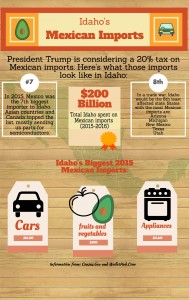By Zach Kyle, The Post Register
When David Snyder, the vice president of global business development for Glanbia Foods, travels from his Twin Falls office to Mexico this week, he expects his conversations with partner companies and colleagues in Glanbia’s Mexico office to share a common topic: the fate of NAFTA.
President Donald Trump has promised to renegotiate or repeal the North American Free Trade Agreement, which went into effect in 1994. It phased out tariffs on goods flowing among the U.S., Canada and Mexico. Trump has said NAFTA resulted in American jobs moving abroad.
“NAFTA is the worst trade deal maybe ever signed anywhere, but certainly ever signed in this country,” he said while campaigning last year.
Exports among the NAFTA partners have tripled since it was signed into law. Some U.S. companies have outsourced work to Mexico, taking advantage of cheaper labor and fewer regulations. Duty-free trade also opened access to Mexican consumers to companies such as Glanbia, which today ships 5 percent of its cheese south of the border, Snyder said.
“When you take the drive from the airport into Monterrey, you go by lots of big U.S. companies with manufacturing facilities,” Snyder said. “If NAFTA went south on them, I honestly don’t know what these guys would do.”
Mixed results on jobs
Canada and Mexico are America’s No. 1 and No. 2 trade partners, accounting for 34 percent of U.S. exports in 2014, according to a Congressional Research Service report on the agreement published Feb. 22.
The report said NAFTA has neither caused job losses feared by critics nor fueled the big economic gains predicted by supporters.
“The net overall effect of NAFTA on the U.S. economy appears to have been relatively modest, primarily because trade with Canada and Mexico accounts for a small percentage of U.S. GDP,” the report said.
However, the agreement has been a game-changer for Idaho agricultural exporters, including Glanbia, Snyder said.
“NAFTA basically opened up Mexico to us in the dairy industry,” he said. “Effectively, Mexico became an extension of the United States in terms of being a trading partner. It gave us a huge competitive advantage over Europe and Oceania.”
‘Fighting for stomachs’
One-quarter of Idaho’s exports went to Canada and Mexico from 2002 to 2016, according to the Idaho Department of Commerce, with 84 percent going to Canada.
Idaho’s exports to Canada are split among a handful of industries, with mining accounting for 30 percent.
Exports to Mexico are dominated by farm and food products. They account for 61 percent of the state’s exports there.
In the past 10 years, the state’s largest agricultural sector, dairy, has more than doubled its exports, with 40 percent heading to Mexico, said Rick Naerebout, director of operations at the Idaho Dairymen’s Association.
“NAFTA has been a winner for the dairy industry,” he said.
Nearly half of Idaho’s farm and food exports went to America’s NAFTA partners last year, said Laura Johnson, chief of the Idaho Department of Agriculture’s marketing and development bureau. With farm production surpassing domestic demand, farmers have offset dropping commodity prices by selling to Mexico and Canada.
“We’re pretty well fed here in the U.S.,” Johnson said. “We’re fighting for stomachs. Our growth in (agricultural) sales is driven by global growth of the middle class.”
Trade agreements, including NAFTA, have been a boon to J.R. Simplot Co., spokesman Josh Jordan said.
“NAFTA helps ensure we can export products — whether it’s french fries and other potato-related products, or fertilizer and crop nutrients — to Mexico and Canada, which are two important markets for us,” he said.
Corona connection
Yet neither cheese nor famous potatoes account for Idaho’s biggest farm and food export to Mexico. That honor goes to a small Idaho crop, barley, shipped as malt used in brewing Corona and other Modelo beer brands.
Modelo’s parent company, Anheuser-Busch InBev, owns one malting plant in Idaho Falls and operates a second there as a joint venture. Kelly Olson, administrator of the Idaho Barley Commission, said one plant produces solely for export to Mexico, accounting for most of the state’s $36 million in annual barley exports to that country.
If NAFTA were repealed and Mexico slapped tariffs on imports, AB InBev would continue to malt Idaho barley for domestic use, Olson said. But farmers here could suffer.
“Overnight, that business goes to Canadian malt plants that are already underutilized,” Olson said. “They raise similar varieties and offer similar quality. They have reasonable freight rates to Mexico. They will do the business if we don’t.”
Though Idaho’s farm and food manufacturers seem to prefer leaving NAFTA alone, other Idahoans say the Trump administration should renegotiate it. Chief among them is Gov. C.L. “Butch” Otter.
NAFTA criticisms
Otter told the Statesman that NAFTA is “a good idea, but we don’t enforce it.”
U.S. sugar policy is supposed to exempt the commodity from NAFTA, limiting imports to protect prices for producers, including Amalgamated Sugar Co., based in Boise. The company processes sugar beets grown in southern Idaho and Oregon.
Otter said Canadian sugar producers violate the spirit of U.S. sugar policy by exporting “stuffed molasses,” or sugar-rich syrups, into the country.
The agreement also lets companies exporting to the U.S. gain advantages by working around the rules, Otter said. Lax environmental rules allow Mexican farmers to use pesticides banned in the U.S., making it tougher for American farmers spending more on safer chemicals to compete, he said.
He also said Canadian timber firms compete unfairly with Panhandle companies under NAFTA. He echoes Idaho’s wood products industry, which has complained for years about unfairness. Under NAFTA, trade disputes are settled by a powerful panel, allowing Canadian lumber manufacturers to sidestep U.S. law, said Betty Munis, director of the Idaho Forest Products Commission in Boise.
“If NAFTA is renegotiated, it is essential this unconstitutional system is eliminated so that the U.S. lumber industry can once again rely upon fair and full application of U.S. law against Canadian unfair trade practices,” Munis said.
Otter said any NAFTA renegotiation must clean up compliance issues.
“We let Canada and Mexico get away with violations all of the time, and we do nothing about it,” he said. “…NAFTA was sold to us as a way of creating a more level playing field, and that hasn’t happened. It has no teeth, and they take advantage of our unwillingness to require compliance.”
Tech exports at risk?
Idaho’s tech industry has also increased exports to NAFTA partners since the agreement took effect.
The sector, including chipmaker Micron Technology Inc., shipped more than $2.2 billion in goods to Mexico and Canada from 2002 to 2016, according to the commerce department. Three-quarters of that went to Canada.
Hewlett-Packard Enterprise CEO Meg Whitman has criticized Trump’s NAFTA and border tax positions for months. In 2016, she said on CNBC that the then-nominee’s trade policies would damage HP’s ability to keep production costs in check.
“If we are prohibited from manufacturing in the right places, that means that jobs in the United States will be jeopardized because Hewlett-Packard Enterprise won’t thrive,” she said.
HP Enterprise and HP Inc. employ several thousand people on the HP campus on Chinden Boulevard in Boise. Calls to HP, Micron and the Idaho Technology Council were not returned.
What if Mexico retaliates?
Naerebout said the dairymen’s concerns are tied to another Trump policy point: immigration. Idaho’s dairies depend heavily on unauthorized immigrant workers.
The dairymen have been collecting signatures on a petition asking Idaho’s congressional delegates to advocate for ensuring the survival of the migrant labor pool by creating a year-round worker visa. This comes as Trump has increased deportations and angered Mexico by promising to make it pay for a wall on the border.
The new administration has already made decisions which suggest that an outright repeal of NAFTA remains a possibility, Naerebout said. Trump’s posturing on Mexico “does give us heartburn,” he said.
“Agriculture products are the first to be retaliated against when countries get into trade wars,” Naerebout said. “There’s already rumblings Mexico might pass legislation to replace U.S. corn with Brazilian corn. Dairy could be on the short list for tariffs.”
Snyder, of Glanbia, said he and other exporters are not yet coming up with contingency plans, though they are worried Trump might be inviting retaliation by antagonizing Mexico. Snyder remains bullish on Glanbia’s trade with Mexico anyway.
“Despite the currency fluctuations and the socioeconomic and political environment, I believe Mexico is a very lucrative destination for our exports,” he said.





